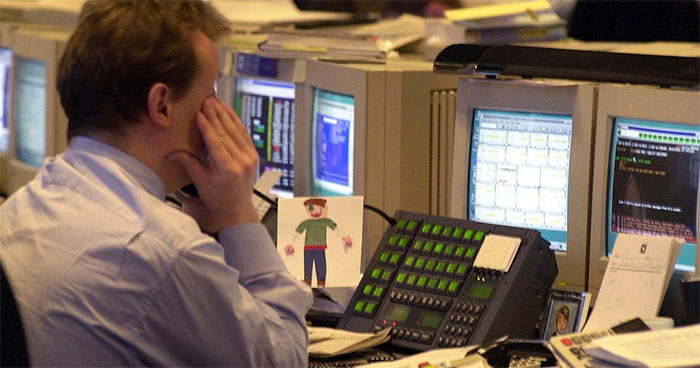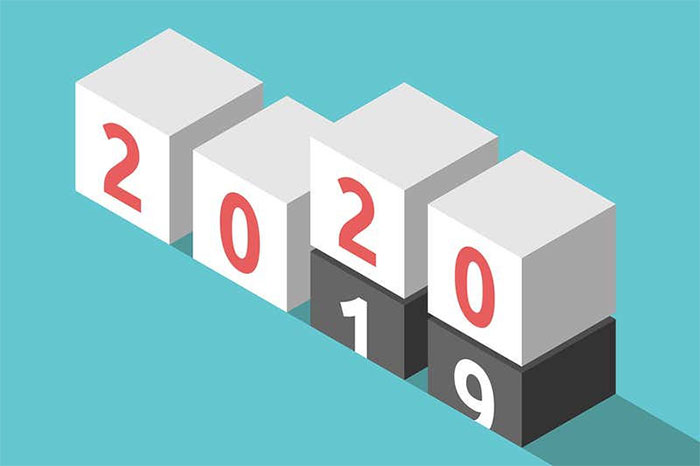The Y2K incident comes back after 20 years
Many computer systems have stopped working on New Year's Day due to laziness in troubleshooting Y2K issues.
More than 20 years ago, the whole world gossiped about the "2000 doomsday" and "Y2K incident" that could cause the entire computer system to collapse, leading to many consequences such as the traffic system stalled, Businesses, banks, government organizations must be closed.
The cause of Y2K comes from the way time computers are saved . Dozens of years ago when memory was expensive, computers, electronic clock chips only used the last two digits of the year instead of four numbers to save storage space. For example, instead of saving 1998, the computer at that time simply saved 98.

The world is racing against time to upgrade the system and reprogram the software before the time reaches the year 2000. (Image: Bloomberg).
Everything happened normally in the 1960s and 1970s, but by the late 1990s, programmers realized computers could not distinguish between 1900 and 2000 because they had the last two digits of 00. When transferred to the world. In the new century, all activities using computers and electronic clock circuits will be reversed.
Millions of people participated in the campaign to fix computer system errors. Programmers have two options to avoid the Y2K problem: rewrite the entire software, or use a faster method called windowing.
According to NewScientist, this way of using processing software to make the computer understand the value from 00 to 19 is 2000 to 2019, the rest is from the previous century. In 1999, up to 80% of computers used this method because of its fast, low cost. Programmers think they will be broken or upgraded in the next 20 years.

Entering 2020, systems that troubleshoot Y2K by "fire fighting" will encounter errors.(Image: Getty Images).
To get the number 19, programmers chose the middle point in a century dating back to 1970. Many programming languages and computers chose the first timeline to calculate the date and time as January 1, 1970, also known as "Unix time".
"Fixing bugs on old systems is a nightmare because not everyone who writes the code is still alive. Programmers don't think their system will still be in use by 2020," said Paul Lomax, an engineer who used to Y2K troubleshooting for Vodafone, share.
By the time we got to 2020, computers that used windowing to fix Y2K had failed because they could not distinguish number 20 as 1920 or 2020.
As noted, some electric bills are dated January 1, 1920, while tens of thousands of parking ticket machines in the US have refused to pay by credit card for the wrong date.

An electricity bill with the date of delivery is January 1, 1920.(Photo: @ lippard / Twitter).
In Poland, thousands of Novitus cash registers were unable to print receipts due to the same problem. WWE 2K20, the wrestling game also stopped working on New Year's day, fortunately when the publisher 2K Sports released a fix later.
The software developer collecting the computer error Splunk has been aware of this since November 2019 and fixed it a week later so the user is not affected.
Many software and computer systems at health facilities are also affected by the "after" Y2K problem. In an interview, health software development firm McKesson confirmed that it had not received any information.
There are many ways to fix this problem: rewrite software code, upgrade a new system or . use windowing to "extinguish" a few more decades.
After 18 years, a similar problem will occur when systems that use 32-bit binary coefficients to store information will stop working, because "Unix time" exceeds the limit value at 3 hours. 14 minutes and 8 seconds on January 19, 2038. This incident is more than 18 years old, while many computers have now moved to 64-bit systems that allow storage time to 292 billion years.
- Incident "millennium" Y2K about to repeat
- The 'millennium' Y2K is about to repeat
- Modern mysteries
- Russia announced the cause of the M-12M progressive ship incident
- Back pain when getting up
- Acne on the back is a sign that the body is being made?
- Things to know about back pain
- Revealed when people most easily suffer from back pain
- The Thua Thien - Hue and Quang Tri seas are beginning to be affected
- Why do the ants go back and forth to the nest, how did they do it?
- Back clever back
- France: Incident at Fessenheim nuclear power plant
- Excavation of dinosaur fossils dating back 135 million years
 America develops cruise missiles in formation
America develops cruise missiles in formation Develop smart contact lenses that the US military has been looking for for a long time
Develop smart contact lenses that the US military has been looking for for a long time 6 best DNS changing software for Windows
6 best DNS changing software for Windows Has found a solution to 'freeze' lithium ion batteries with liquid nitrogen, avoiding batteries to explode if there is a collision
Has found a solution to 'freeze' lithium ion batteries with liquid nitrogen, avoiding batteries to explode if there is a collision